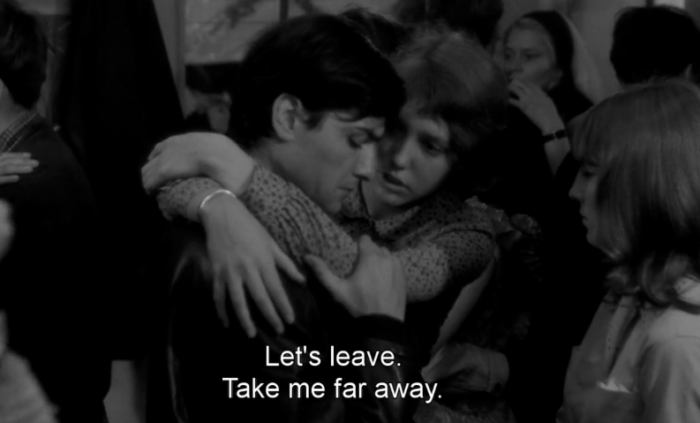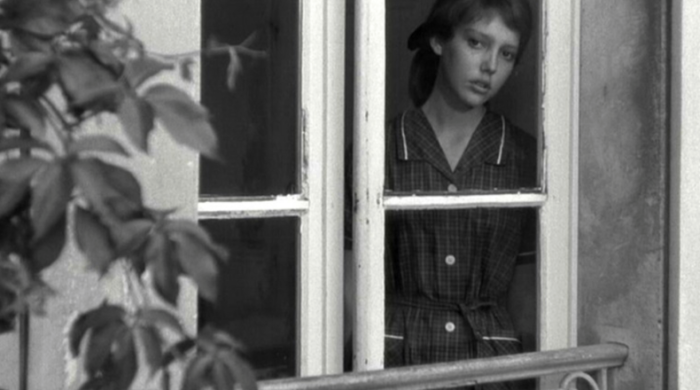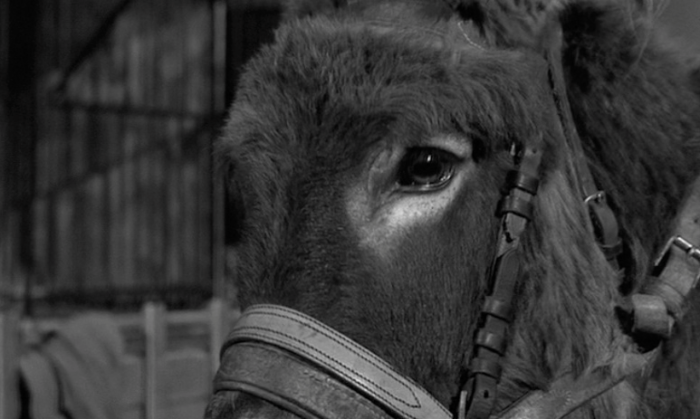
Contains Spoilers
Au Hazard Balthazar is only my third entry for Criterion Month but thanks to this film and Umberto D. I have already discovered the recipe for misery:
1 Cup. sad animal (treat poorly)
2 Tbs. non-professional actors
1 Tsp. post-war Europe
A dash of minimalism (for tasting)
Add “Fin” for garnish and serve in a dilapidated art house theater constantly on the verge of closing. Cry.
Do you want to know the opposite of a feel good movie? It’s this movie. I want to appreciate these European “slice of life” movies I’ve been watching but it’s so hard when that slice is filled with salt instead of sugar. At least in Umberto D., I could pretend there was hope. In Au Hasard Balthazar everything sucks for everybody all the time. I mean, why do so many cinephiles flock to such a somber story? A story that American audiences couldn’t even see until 1970 and couldn’t see with subtitles until 2003.
Let’s start with the film’s director Robert Bresson. I can’t tell you much about Bresson’s career as a whole but I can tell you what I’ve learned about his directing from today’s film. For starters, Bresson wasn’t fond of professional actors. From what I read, it sounds like Bresson found the whole idea of “star power” to be distracting, that bigger name actors were too over-the-top or theatrical on camera. In fact, instead of casting calls, Bresson would often drive around small villages in France searching for interesting faces and interesting people. Where I can appreciate the train of thought, It’s Bresson’s method of directing these small towners that I don’t understand.
Reportedly, Bresson would have his actors do scenes upwards of fifty times. His reasoning was to tire his actors so much that it would drain even the slightest hint of emotion. Bresson wanted the audience to be given a blank slate to which they could project their own idea of what the characters were feeling. As Roger Ebert wrote in his original review “”The actors portray lives without informing us how to feel about them; forced to decide for ourselves how to feel, forced to empathize, we often have stronger feelings than if the actors were feeling them for us.”
Now I’m all for amateur talent—if not to find untapped potential—but if Bresson is going to put an amateur on camera and suck out their soul, I fail to see the reason to hire amateurs in the first place. Anyone can be a blank slate, amateur or professional. I can understand trying to avoid big egos or cut costs by using non-professional actors, but if you don’t want to tap into these REAL people why does it matter that they are real people at all? This is why I wasn’t a fan of any character outside of Balthazar… Oh, and if you don’t already know, Balthazar is a donkey.
The film begins with Marie (Anne Wiazemsky) and Jacques (Walter Green), a pair of children spending their summer in a rural village near Switzerland. They receive a donkey as a pet and they name him Balthazar, but not long after Jacques leaves for Paris. Jacque’s father entrusts Marie’s father (Philippe Asselin) with managing a farm and the story jumps ahead a handful of years. Marie, now 16, has become separated from Balthazar after legal and financial issues her father has with the farm. Jacques returns and declares his love for Marie and also Balthazar unexpectedly returns after running away from his new owner. Seems a bit random and convenient that these two events occur so close to each other, but life can be random from time to time.
Of course, Balthazar has to be sold again to make up for problems with the farm. Didn’t really seem like it was Marie’s father’s right to sell Balthazar though considering he was no longer the owner. Balthazar is sold to a baker (François Sullerot) and Marie, uninterested in Jacques, falls in love with the baker’s son, Gérard (François Lafarge), who looks and acts like a character from Quadrophenia with his hip clothes and moped. Gérard turns out to be a jerk and is cruel to Balthazar but not for long because Balthazar is sold to Arnold (Jean-Claude Guilbert), the town drunk. Arnold uses Balthazar to give rides to tourists and later sells Balthazar to the circus, where the donkey performs multiplication problems by stamping his feet… Oh man, TV must have really sucked back then.
Soon after, Balthazar is sold to a corn merchant who starves the donkey and works him to near death. The corn merchant sells Balthazar back to Marie’s family where things haven’t been going well. Marie has left home to avoid her abusive relationship with Gérard but Gérard finds her, beats her and strips her naked in an abandoned house. Gérard takes Balthazar and tries to use him to smuggle contraband across the border only to be chased off by customs officials with guns. Now here’s where this film really sours my buttermilk.
In the brief encounter with customs, Balthazar is shot. He then wanders away to a field of sheep and dies. Or at least I think he does. It’s hard to tell because I can tell the donkey isn’t actually dead. But I confirmed the ending with some help from the good people at the Turner Classic Movies website. Now I’m pissed.
I hate when animals die in movies. Anytime I plan on watching a movie with a dog, I always check www.doesthedogdie.com beforehand. I can’t take it. If the film had its share of feel good moments maybe it could balance out the pain of killing an innocent creature who lived a sad life, but it doesn’t. Marie is loving and she is abused and humiliated. Arnold, the drunk, is one of Balthazar’s nicer owners and he also dies. Gérard is almost killed but gets away. I get it, life doesn’t always work out for good people, but there’s a point in the three-act structure of storytelling known as the “resolution” that I hold very dear, but I wasn’t sure what that was supposed to be in Au Hasard Balthazar.
The resolution is supposed to result in a catharsis (emotional release) for the viewer. Au Hasard Balthazar has no release. Nor does Marie or Balthazar overcome any personal demons or learn a lesson. Unless the lesson is that Marie should let Gérard beat her and give him total control over her life. I understand not all film’s follow the same road map but I wasn’t comfortable with this veering so far off track.
At this point, you might be curious as to why I gave this film a positive rating. Well, it is beautiful visually, there’s no denying that. But also, there are two scenes I can’t get out of my head. One is when Balthazar is sold to the circus and waits in a cage. The scene cuts back and forth between Balthazar and the other animals, staring and growling. Critics say Bresson would purposefully design scenes to be emotionally ambiguous but I don’t see any other way to interpret this scene than it being about fear. Balthazar is in a scary place, we are scared for him because we don’t know what the future holds.
The second scene is the last scene where Balthazar wanders through the flock of sheep. Again, this scene makes the viewer fearful. “Is Balthazar going to die? Will anybody find him?” When it becomes clear no one will the scene becomes the most depressing thing put to celluloid. Though it does bring up an interesting question.
Would this film be better had it been told through the eyes of Balthazar? I think so. The film has too many long stretches without Balthazar. I’m not interested in watching emotionless amateur actors bemoan their existence. Maybe Au Hasard Balthazar should have taken the War Horse approach of having the animal be the main focus of every scene. Except, War Horse kind of sucks, so maybe not. Still, I see the seed of a more inspiring story in his dried out husk of misery.
There’s no denying Au Hasard Balthazar is art. It looks like art, it sounds like art, it’s both complex and simple like art, but a film is a balancing act. A film is also a story and Au Hasard Balthazar feels half written. There’s a reason this film took so long to catch on in America. It’s such an acquired taste and we don’t like to feel sad as shit. There’s enough misery already. I commend the film for its ability to make me feel such strong emotions but that doesn’t mean I have to like that it makes me feel that way. Sorry, that’s all I can write, for now. I think my tears are short circuiting my laptop.
Let’s all drop a 40 for my good buddy Balthazar. RIP.







